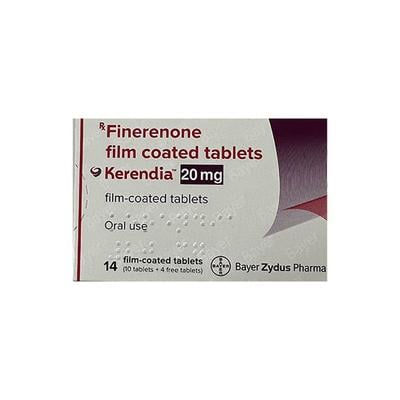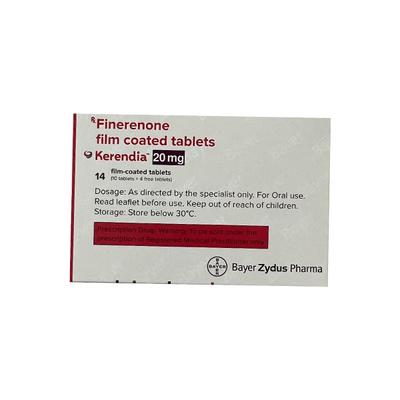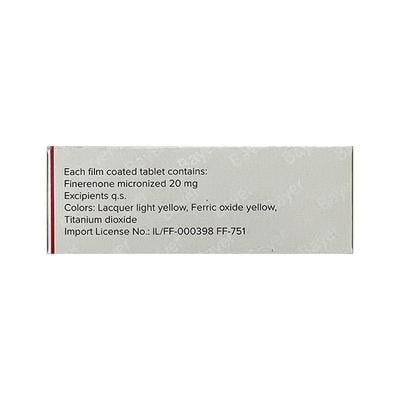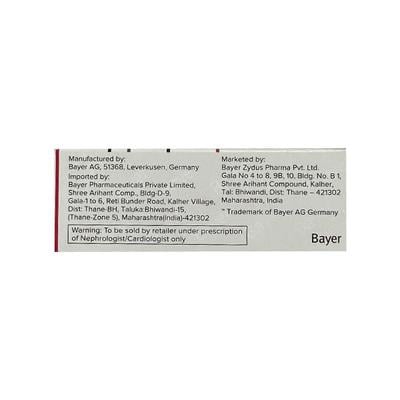

Netmeds First Membership
Quick Links
Introduction About KERENDIA 20MG TABLET
KERENDIA 20MG TABLET contains Finerenone which belongs to a group of medicines called non-steroidal mineralocorticoid receptor antagonist. It is indicated in the management of chronic kidney disease (stage 3 and 4 with abnormal presence of albumin (a type of protein) in the urine) associated with type 2 diabetes in adults.
Finerenone works by blocking the action of certain hormones within the body that can damage your kidneys and heart. During management with KERENDIA 20MG TABLET, your doctor will constantly monitor your kidney functions and blood potassium levels to analyse the safety and efficacy of the management.
Take KERENDIA 20MG TABLET as directed by your physician. Swallow the medicine with a glass of water. Do not crush or chew the medicine. It can be taken with or without meals.
Do not eat grapefruit or drink grapefruit juice as long as you take KERENDIA 20MG TABLET, as it could lead to unpleasant side effects. Before taking KERENDIA 20MG TABLET, inform your doctor if you have high blood potassium levels. Do not take KERENDIA 20MG TABLET if you are allergic to finerenone or have Addison’s disease.
KERENDIA 20MG TABLET is not recommended for use in pregnant women unless your doctor states it is clearly necessary. Women of childbearing potential must use a reliable contraceptive method to avoid pregnancy while taking this medicine. Do not take KERENDIA 20MG TABLET during breastfeeding as it may pass through the breast milk and harm the nursing infant.
Avoid concomitant use of KERENDIA 20MG TABLET with antibacterial, antifungal and antiviral agents, potassium supplements, antidepressants and blood pressure lowering agents as a precaution. The most common side effects of taking KERENDIA 20MG TABLET are high blood potassium, sodium and uric acid levels and low blood pressure. Consult your doctor if any of these side effect troubles you.
Uses Of KERENDIA 20MG TABLET
- Management of chronic kidney disease (stage 3 and 4 with abnormal presence of albumin in the urine) associated with type 2 diabetes in adults
How KERENDIA 20MG TABLET Works
Finerenone works by blocking the effects of a hormone called aldosterone, which is involved in regulating salt and water balance in the body. Aldosterone tends to cause the retention of salt and water, leading to increased blood pressure and stress on the kidneys.
By inhibiting the action of aldosterone, finerenone helps to reduce the retention of salt and water, ultimately lowering blood pressure and alleviating the strain on the kidneys. This can be beneficial in slowing down the progression of kidney damage in people with diabetes and chronic kidney disease.
How to use KERENDIA 20MG TABLET
Take KERENDIA 20MG TABLET under careful medical supervision. It can be taken with or without food. It is usually recommended as one dose per day. However, the dose frequency may vary depending on your age and health condition.
Swallow the medicine with a glass of water. Do not crush or chew the medicine. Strictly follow the dosing schedule as advised by your physician to get better results.
Side Effects Of KERENDIA 20MG TABLET
Common
- high potassium level (hyperkalaemia; signs include weakness or tiredness, nausea, numbness in the hands and lips, muscle cramps, slow pulse rate)
- low sodium level (hyponatraemia; signs include nausea, tiredness, headache, confusion, muscle cramps)
- high uric acid level (hyperuricaemia)
- low blood pressure causing dizziness and fainting
Uncommon
- low haemoglobin (Hb) levels
How To Manage Side Effects
Hypoglycemia
To manage low blood pressure effectively, consider increasing fluid intake to manage dehydration and boost blood volume. Consuming slightly more salt under medical supervision can help raise blood pressure. Eating smaller, more frequent meals and avoiding alcohol can manage sudden drops in blood pressure. Gradual changes in position, such as rising slowly from sitting or lying down, can reduce symptoms of dizziness. If lifestyle adjustments are insufficient, consult a healthcare professional for personalized advice and, if necessary, medication adjustments to address the underlying causes of low blood pressure.
Warning & Precautions
Pregnancy
Monitoring requiredKERENDIA 20MG TABLET is not recommended for use in pregnant women unless your doctor states it is clearly necessary. Therefore, inform your doctor before taking KERENDIA 20MG TABLET, if you are pregnant or planning to become pregnant. Women of childbearing potential must use a reliable contraceptive method to avoid pregnancy while taking this medicine.
Breastfeeding
ContraindicatedDo not take KERENDIA 20MG TABLET during breastfeeding as it may pass through the breast milk and harm the nursing infant. Therefore, consult your doctor before taking it.
Driving and Using Machines
Use with CautionKERENDIA 20MG TABLET has no effect on your ability to drive or handling heavy machines.
Kidney
Use with CautionKERENDIA 20MG TABLET should be used with caution in patients with severe loss of kidney function or kidney failure. Therefore, consult your doctor before taking it.
Liver
Use with CautionKERENDIA 20MG TABLET should be used with caution in patients with moderate or severe liver problems. Therefore, consult your doctor before taking it.
Allergy
ContraindicatedDo not take KERENDIA 20MG TABLET if you are allergic to Finerenone. Inform your doctor before taking it.
Heart Disease
Use with CautionKERENDIA 20MG TABLET should be used with caution in patients with heart failure. Therefore, consult your doctor before taking it.
Use In Pediatrics
Monitoring requiredThe safety and efficacy of KERENDIA 20MG TABLET is not established in children and adolescents (aged 18 years or older). Therefore, it is not recommended for use in children unless advised by your doctor.
Use In Geriatrics
Use with CautionKERENDIA 20MG TABLET should be used with caution in elderly patients. Therefore, consult your doctor before taking it.
Others
KERENDIA 20MG TABLET is not recommended for use if you:
- have Addison’s disease (an endocrine disorder in which adrenal glands does not produce sufficient hormones)
Before taking KERENDIA 20MG TABLET, inform your doctor if you:
- have high blood potassium levels
Interactions
A. Drug-Drug Interactions:
Before taking KERENDIA 20MG TABLET inform your doctor if you are taking any of the following medicines:
- antifungal agents (such as itraconazole or ketoconazole)
- anti-HIV agents (such as ritonavir, nelfinavir, or cobicistat)
- antibacterial agents (such as clarithromycin, telithromycin)
- diuretics (such as amiloride or triamterene)
- other medicines similar to finrenone (such as eplerenone, esaxerenone, spironolactone, or canrenone)
- trimethoprim, or a combination of trimethoprim + sulfamethoxazole (used for bacterial infections)
- potassium supplements
- erythromycin (an antibacterial agent)
- verapamil (cardiac drugs)
- rifampicin (used for TB)
- antiepiletics (such as carbamazepine, phenytoin, or phenobarbital)
- antidepressants (such as St. John´s Wort, fluvoxamine and nefazodone)
- blood pressure lowering agents (such as atenolol, amlodipine, enalapril, telmisartan, Olmesartan)
B. Drug-Food Interactions:
Do not eat grapefruit or drink grapefruit juice as long as you take KERENDIA 20MG TABLET, as it could lead to unpleasant side effects caused due to overdose of finerenone.
Synopsis
| Drug | : | Finerenone |
| Pharmacological Category | : | Nonsteroidal mineralocorticoid receptor antagonist |
| Therapeutic Indication | : | Chronic Kidney disease |
| Dosage Forms | : | Tablet |
More Information
Storage
- Keep KERENDIA 20MG TABLET out of reach of children
- Store KERENDIA 20MG TABLET at room temperature
FAQs About KERENDIA 20MG TABLET
Q: What is the use of KERENDIA 20MG TABLET?
A: KERENDIA 20MG TABLET is used in the management of chronic kidney disease in patients with type 2 diabetes.
Q: How does KERENDIA 20MG TABLET work?
A: Finerenone is a selective nonsteroidal mineralocorticoid receptor antagonist. It works by blocking the effects of aldosterone, a hormone that can contribute to kidney damage by causing salt and water retention.
Q: What are the common side effects of KERENDIA 20MG TABLET?
A: The most common side effects of taking KERENDIA 20MG TABLET are high blood potassium, sodium and uric acid levels and low blood pressure which reflect with symptoms such as nausea, tiredness, weakness, muscle cramps, numbness of hands and feet, dizziness and joint pain. Consult your doctor if any of these side effect troubles you.
Q: Can KERENDIA 20MG TABLET be taken with other medications?
A: KERENDIA 20MG TABLET may interact with certain medications, so it's important to inform your healthcare provider about all the medications, supplements, and herbal products you are taking. They can determine if there are any potential interactions. Especially, avoid concomitant use of KERENDIA 20MG TABLET with antibacterial, antifungal and antiviral agents, potassium supplements, antidepressants and blood pressure lowering agents as a precaution.
Q: How should KERENDIA 20MG TABLET be taken?
A: KERENDIA 20MG TABLET is typically taken orally with or without food, as directed by a healthcare professional. It's essential to follow the prescribed dosage and instructions carefully.
Q: Is KERENDIA 20MG TABLET safe during pregnancy and breastfeeding?
A: KERENDIA 20MG TABLET is not recommended for use in pregnant or breastfeeding women as it may harm the growing foetus and nursing infant.
Q: Can KERENDIA 20MG TABLET be used in individuals without diabetes?
A: KERENDIA 20MG TABLET is primarily indicated for individuals with type 2 diabetes and chronic kidney disease. Its use in those without diabetes may be considered by healthcare providers on a case-by-case basis.
Q: How long does it take for KERENDIA 20MG TABLET to show results?
A: The time it takes for KERENDIA 20MG TABLET to show noticeable effects on kidney function can vary. It's important to adhere to the prescribed management plan and attend regular follow-up appointments with a healthcare provider.
Q: Are there lifestyle changes recommended while taking KERENDIA 20MG TABLET?
A: Healthcare providers may recommend certain lifestyle changes, such as dietary modifications and increased physical activity, to complement the effects of finerenone. It's crucial to discuss any potential lifestyle changes with your healthcare team.
Q: What should I do if I miss a dose of KERENDIA 20MG TABLET?
A: If a dose is missed, it is generally recommended to take it as soon as you remember. However, if it is almost time for the next scheduled dose, it's advisable to skip the missed dose and continue with the regular dosing schedule. Double doses should be avoided. If there are concerns or uncertainties, consult with a healthcare provider.
References
1. Finerenone. MedlinePlus. [Revised in August 2021]. [Accessed on 28th February 2024] https://medlineplus.gov/druginfo/meds/a621038.html#:~:text=Finerenone%20is%20in%20a%20class,damage%20the%20heart%20and%20kidneys.
2. Bayer plc. Kerendia 10 mg film-coated tablets Kerendia 20 mg film-coated tablets finerenone. Electronic Medicines Compendium (EMC). [Revised in July 2023]. [Accessed on 28th February 2024] https://www.medicines.org.uk/emc/files/pil.13438.pdf
Useful Diagnostic Tests
- Urine Routine & Microscopy
- Kidney Function Test (KFT)
- Creatinine, Serum
- Uric Acid, Serum
- Albumin, Serum











